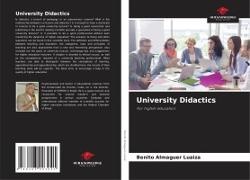Read more
Is didactics a branch of pedagogy or an autonomous science? What is the relationship between curriculum and didactics? Is it enough to have a doctorate in science to be a good university lecturer? Is being a good researcher and publishing in the world's leading scientific journals a guarantee of being a good university lecturer? Is it possible to be a good professional without even mastering the dynamics of higher education? The answers to these and other questions can be found in this scientific work. The definition and differentiation between teaching and education, the categories, laws and principles of teaching are also approached from a new and interesting perspective. Also included are the types of university classes, technology tips and suggestions for higher education lecturers. A chapter is devoted to ethical issues, as well as the competences required of a university teaching professional. When teachers are able to distinguish between the conceptions of learning, apprenticeship and apprenticeship, which are clarified here, the results of their teaching work will be superior. The book aims to encourage a leap in the quality of higher education.
About the author
Psychoanalyst and doctor in educational sciences from the Universidad de Oriente, Cuba, he is the Director-President of CEPEDH in Brazil. He is a guest lecturer and researcher for several master's and doctoral programmes in various countries. Evaluator and international editorial member of scientific journals for higher education institutions and the Federal Chamber of Brazil.

